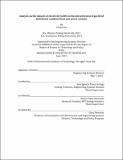Analysis on the impacts of electricity tariffs on the attractiveness of gas fired distributed combined heat and power systems
Author(s)
Du, Yichen
DownloadFull printable version (7.010Mb)
Alternative title
How electricity impacts the attractiveness of gas fired distributed cogeneration technologies
Other Contributors
Massachusetts Institute of Technology. Technology and Policy Program.
Advisor
Jose Ignacio Perez-Arriaga and Karen Tapia-Ahumada.
Terms of use
Metadata
Show full item recordAbstract
In order to achieve a more sustainable energy system, regulators and the industry are trying to balance among many challenging issues such as environmental concerns, economic efficiency and security of supply. In Europe, the environmental concerns are getting a higher weight in current discussions. While it is important to continue exploring the potential of renewables as well as other clean energy sources, finding a more effective way to utilize existing resources is also a viable solution. Combined heat and Power (CHP), also known as cogeneration, denotes a group of technologies that generate electricity and useful heat concurrently. Benefits of distributed CHP technologies arise from their direct connection to distribution and customer facilities, which can potentially alleviate transmission and distribution network constraints, lower network energy losses, improve system reliability, and result in CO2 emissions reductions and overall capital cost. This thesis focuses on understanding the technological, social and economic attractiveness of CHP technologies under different tariff designs, market conditions and incentives. It not only looks at the optimum economic value of CHP to individual customers, but also impacts on the system peak load and the environment. For that purpose, the thesis develops a methodology that focuses on analyzing customers' reactions to various exogenous parameters by looking at their CHP installation and operation decisions. Moreover, it adopts an overarching framework that integrates and streamlines the processes from simulation of customers' energy loads, representation of regulatory and market conditions, to the generation and interpretation of the installation and operations decisions. Results suggest that many distributed CHP technologies could bring positive economic value to the customers even without considering incentives. In the meanwhile, metrics like CO2 emissions, overall efficiency and system peak reduction all improved with the introduction of NGDCHPs. These observations confirm that NGDCHP systems have the potential to reduce costs at both the individual customers' level and at the system level. Moreover, we find that customers' decisions are noticeably influenced by the tariffication and incentive methods. Volumetric-only tariffs suffer from potential cross-subsidization and insufficient remuneration for network companies, but encourage higher utilization rate and installations because of the higher variable electricity price. In comparison, breaking down the electricity prices based on different cost drivers could send the correct economic signals to the customers while still meeting the sustainability principle for tariff designs. Additionally, we find that changing market conditions can have significant effects on the economic value of CHP systems installed on-site, and the annual savings are most sensitive to electricity purchase prices. In conclusion, the goal of this research is to explore the value of gas fired distributed CHP systems under different settings. It informs the private sector as well as the policymakers by how to realize the potential benefits of distributed CHP systems. In the future, the methodology and framework developed in this thesis could be further applied to analyze scenarios where distributed CHP penetration is high and is coupled with other distributed energy resources.
Description
Thesis: S.M. in Technology and Policy, Massachusetts Institute of Technology, Engineering Systems Division, Technology and Policy Program, 2015. Title as it appears in MIT Commencement Exercises program, June 5, 2015: How electricity impacts the attractiveness of gas fired distributed cogeneration technologies. Cataloged from PDF version of thesis. Includes bibliographical references.
Date issued
2015Department
Massachusetts Institute of Technology. Engineering Systems Division; Technology and Policy ProgramPublisher
Massachusetts Institute of Technology
Keywords
Engineering Systems Division., Technology and Policy Program.